|
|
|
Sort Order |
|
|
|
Items / Page
|
|
|
|
|
|
|
| Srl | Item |
| 1 |
ID:
171499


|
|
|
|
|
| Summary/Abstract |
This research centers around the question: How can provincial governments take the lead in implementing an adaptive governance approach considering citizen-led wind energy development? A framework for ‘accommodative leadership’ was created - building on the work of Meijerink and Stiller (2013) regarding leadership in climate change adaptation, and the work of Sotarauta (2010) on place leadership. The combination of the two provides a leadership framework which aims to include both governmental actors and local citizens initiatives as potential leaders in wind energy development.
Three cases studies in three regions of the Netherlands were assessed. The results show that provinces adopt various leadership styles, referred to as ‘facilitative decentralization’, ‘deliberative innovation’ and ‘authoritative reluctance’. Our conclusion is that there is no roadmap for effective accommodative leadership, as it occurs in many forms. Nonetheless the developed framework can be used by regional governments as an assessment tool to understand the roles and actions which can potentially be taken by this authority to purposefully allocate their leadership capacities, while allowing citizen-led wind energy development.
|
|
|
|
|
|
|
|
|
|
|
|
|
|
|
|
| 2 |
ID:
196964


|
|
|
|
|
| Summary/Abstract |
International attention toward energy transition has seen significant growth recently. Each region has focused on some of its aspects according to its own context. Our work focuses on African countries and analyses their energy transition. Our study adds to the literature on energy transition studies by understanding the energy landscape of African countries and identifying similarities and differences between them using a cluster analysis based on a multivariate Euclidean distance measure. Thanks to this measure, we highlighted four clusters. We discuss how these clusters are explained by similar economic, political and cultural factors. The cluster that uses the most RE (Green-Cluster) has low political stability and high foreign direct investment, suggesting that RE can be an opportunity to attract investors and enhance green economic development. Countries of cluster that show high FF consumption (Brown-cluster), have high CO2 emissions but better economic and social situations. Lastly, we proposed diverse policy implications for the different clusters, offering a range of indications aimed at advancing specific Sustainable Development Goals. It is necessary to focus on developing strategies to leverage RE and enhance governance for countries of Green-Cluster. For Brown-cluster, they should accelerate the transition to cleaner energy sources to combat climate change.
|
|
|
|
|
|
|
|
|
|
|
|
|
|
|
|
| 3 |
ID:
183587
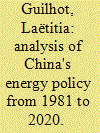

|
|
|
|
|
| Summary/Abstract |
Looking back at four decades of China's energy policy (1981–2020), three momentous shifts can be said to have taken place. From the Sixth Five-Year Plan (1981) to the Ninth Five-Year Plan (2000), the focus was exclusively on improving energy efficiency. Subsequently, from the Tenth Five-Year Plan (2001) to the Eleventh Five-Year Plan (2010), energy security also became a major objective, as awareness of the gradual depletion of fossil fuels grew. From 2011 onwards (Twelfth and Thirteenth Five-Year Plans), China's energy policy has also aimed to ward off climate change. This policy evolution suggests that the Chinese economy has initiated a low-carbon energy transition since 2011. Nevertheless, this transition cannot be considered sustainable because the local government are reluctant to apply stringent institutional limitations to wealth-creating processes within their jurisdiction and because China's energy consumption is not decoupled from its economic growth and total environmental costs of renewable energy are not taken account. In seeking to usher in a sustainable energy system, the Chinese government needs to overcome three challenges: 1/an institutional challenge; 2/an economic challenge and 3/an environmental challenge.
|
|
|
|
|
|
|
|
|
|
|
|
|
|
|
|
| 4 |
ID:
180856


|
|
|
|
|
| Summary/Abstract |
The energy transition that is developing across the United States is producing both winners and losers. While some individuals, households and communities are reaping the benefits of the move toward cleaner, renewable sources of energy, others are experiencing its adverse effects, such as disruptions to labor markets, higher energy prices, and pollution and health burdens. To address these disparities, policymakers are increasingly calling for energy justice. However, there is scant scholarly literature on either the prevalence or characteristics of energy justice programs that already exist. Here we show that energy justice programs are both quite widespread and diverse across the United States, are most often led by nonprofit organizations rather than government agencies, and, while many share common missions, programs entail unique and often innovative strategies to achieve their objectives. The analysis lends important insights into current energy justice programs, but we argue deeper evaluation is necessary to identify which efforts are efficacious.
|
|
|
|
|
|
|
|
|
|
|
|
|
|
|
|
| 5 |
ID:
171390


|
|
|
|
|
| Summary/Abstract |
Addressing the threat of global climate change will require large-scale transformation of our energy systems. Scholars are increasingly calling for a more systemic approach to studying energy transitions—one that incorporates human dimensions such as behaviors, attitudes, perceptions, and preferences. Drawing on an exploratory representative study (n = 379 surveys) conducted in the Pogány-havas microregion of eastern Transylvania, Romania, we employ Stephenson et al.’s Energy Cultures Framework to describe and discuss the social and material energy system of the region. We highlight the interactions between norms, energy practices and material culture, as well as external influences that are shaping the energy system. We discuss attitudes towards energy conservation and acceptability of community renewable energy schemes. Based on our findings, we define the dominant energy culture of the region and highlight elements of the system that are either reinforcing the status quo or shaping a more sustainable energy culture. We discuss implications for increasing the efficiency of the energy system of this region and factors that could inform energy policies and sustainability interventions. We conclude by situating our research within a larger narrative of rural energy transitions and discuss the value of a systems approach when undertaking energy systems research.
|
|
|
|
|
|
|
|
|
|
|
|
|
|
|
|
| 6 |
ID:
116690
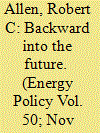

|
|
|
|
|
| Publication |
2012.
|
| Summary/Abstract |
This history of the transition from organic to mineral fuels suggests a number of conclusions that may have parallels in the future: People respond to price incentives; science is important but not sufficient; human capital is important; cooperation is as important as competition; path breaking technologies take a long time to mature.
The future, however, will not - and should not! - be a replay of the past. One of the greatest differences is the externality issues raised by global warming. The choice of fuels and technologies has ramifications far beyond the profit and loss statements of the people deciding them. In that case, decentralized decision making will not reach a desirable overall result. Planning and coordination are essential to tackle these problems.
|
|
|
|
|
|
|
|
|
|
|
|
|
|
|
|
| 7 |
ID:
166429
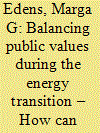

|
|
|
|
|
| Summary/Abstract |
Distribution of electricity constitutes an essential link in the energy sector value chain for which Distribution System Operators (DSOs) bear the responsibility. While executing that role, DSOs are expected to take into consideration public values, such as the availability, affordability and sustainability of the infrastructure they manage.
|
|
|
|
|
|
|
|
|
|
|
|
|
|
|
|
| 8 |
ID:
181459


|
|
|
|
|
| Summary/Abstract |
Low carbon development involves profound changes in existing countries’ governing structures. Recent studies have shown that significant benefits to low carbon development in developing countries can be achieved from energy sector transitions. This paper argues that energy transition in Botswana which involves reduction of dependence on coal-generated electricity and increase in the uptake of solar energy can only be achieved through regime-based reconfigurations driven by deliberate government action and political will. It draws on energy transition literature to examine whether existing policy instruments can drive the desired transition. Through in-depth qualitative analysis, it identifies barriers that impede transition attempts to date. As an effort to overcome regime level barriers in particular, the paper proposes several low-cost changes in the existing electricity regime to facilitate a wider energy sector transformation.
|
|
|
|
|
|
|
|
|
|
|
|
|
|
|
|
| 9 |
ID:
190617
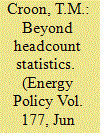

|
|
|
|
|
| Summary/Abstract |
Recent energy price spikes have led to increased energy poverty among low-income households living in inefficient homes. Accurate statistics on energy poverty help inform resource allocation and better target relief schemes and retrofit funds. Existing indicators are predominantly defined in terms of a headcount ratio – the share of population living below a certain threshold or poverty line. In this paper we draw from the literature on income poverty evaluation to argue that the use of more elaborate energy poverty gap indices can substantiate the design and monitoring of energy poverty policies, by not only considering incidence but also intensity and inequality of energy poverty across households. We demonstrate that the choice for a particular energy poverty (gap) indicator makes the implicit welfare choices of energy poverty policies explicit. We illustrate our arguments for the case of the Netherlands, using recently developed microdata statistics on energy poverty, and an imposed energy price shock. We show that spatial targeting of relief funds based on incidence would neglect the full depth of energy poverty deprivation. Finally, we argue that visualisation techniques from the income poverty literature help to comprehend different poverty orderings and draw comparisons between time periods, regions, and subgroups.
|
|
|
|
|
|
|
|
|
|
|
|
|
|
|
|
| 10 |
ID:
192831
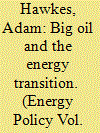

|
|
|
|
|
| Summary/Abstract |
International Oil Companies (IOCs) represent a significant source of capital and expertise that could be deployed to contribute to the investment required to achieve the energy transition to a low carbon future. This paper sheds light on the current motivations for mergers and acquisitions (M&A) by the various energy sectors and focusses on policies and commercial contexts that would favour IOCs incorporating renewables into their core business. An empirical analysis of a twenty-year history of M&A in the energy sector, covering over 10,000 transactions, is complemented by an economic model that differentiates between investment for innovation and investment for scale and transaction benefit. The analysis confirms that in the case of renewables, IOCs are currently at the exploratory stage of business development and appear to be valuing innovation based on renewables on subset of their business. The analysis concludes that IOCs favour core investment in functioning competitive energy markets rather than in rate-of-return regulated assets, and that for IOCs in particular policies and market rules directed towards that end would favour both near- and long-term investment by them into low carbon energy.
|
|
|
|
|
|
|
|
|
|
|
|
|
|
|
|
| 11 |
ID:
136210


|
|
|
|
|
| Summary/Abstract |
Biomass in the form of crop residues and firewood is a major energy source for rural households in China. A survey conducted in the provinces of Shanxi, Zhejiang, and Guizhou shows that 37 percent of rural households use bioenergy for heating and cooking and that bioenergy accounts for 18 percent of their total energy consumption. Most of the biomass used for energy is burned in traditional stoves, contributing to indoor air pollution in rural homes. Crop residues also are commonly burned in the fields, contributing to the high level of outdoor air pollution in China. Our econometric analysis of the key determinants of bioenergy use shows that bioenergy consumption falls modestly with income growth, increased time required for biomass collection, and less farmland. Hence, open burning of some biomass is an optimal choice and is likely to become more of a problem without policy intervention. These findings suggest that a more sustainable use of biomass requires policies that promote cleaner, more efficient bioenergy combustion technologies and increase the economic value of biomass such that local households can benefit from biomass collection.
|
|
|
|
|
|
|
|
|
|
|
|
|
|
|
|
| 12 |
ID:
169718


|
|
|
|
|
| Summary/Abstract |
Oil prices wide fluctuations have been a constant in energy economics, influencing heavily the profits of oil companies. Even small oil prices changes imply wide variations in the refining margins, the main economic drivers of the profits of oil companies with relevant refining assets. The future will bring an even more volatile environment as the level of implementation of low-carbon policies increases, implying a declining demand for refined products for internal combustion engine vehicles. One of the possible paths to mitigate the refining margin volatility and the decreasing demand for refined products is to switch gasoline production to aromatics products, through new aromatics plants. In this paper we apply the copula-GARCH model with Monte Carlo simulation to evaluate the economic impacts of this production switching, supporting a European oil company's decision. The results show that the product switch success depends on gasoline prices and on how the aromatics plant is built, if in stand-alone mode or integrated with the refinery. It is also shown that the desired reduction of the integrated refining margin volatility is not achieved with the product switching.
|
|
|
|
|
|
|
|
|
|
|
|
|
|
|
|
| 13 |
ID:
162974


|
|
|
|
|
| Summary/Abstract |
This study investigates from a socio-technical perspective the emergence of Solar Photovoltaic electricity (PV) in Brazil and identifies challenges and opportunities of PV energy in the country. The research is based mainly on primary data from 2015 to 2016 including 15 in-depth interviews with representing relevant actors from the system. Additional written data involved resolutions, regulations and reports from the official government organizations. Multilevel perspective and the functions of innovation systems perspective were used for data analysis. The need for the dissemination of PV energy includes the establishment of long-term clear goals, fiscal and financial incentives, more attractive opportunities for investors as well as professional training courses. The paper includes a critical review of the applicability of the multilevel perspective and functions of innovation system with recommendations for adapting them to better fit this case. What is especially interesting to derive from the analysis is the impact of the niche developments on the regime and the landscape, especially in the establishment of a domestic PV energy industry, national economic growth, local and regional development, which would result from the dissemination of PV energy.
|
|
|
|
|
|
|
|
|
|
|
|
|
|
|
|
| 14 |
ID:
177165
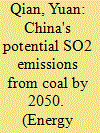

|
|
|
|
|
| Summary/Abstract |
Coal is the dominant emitter of Sulfur Dioxide (SO2) in some countries, comprising ~92% of total emissions in China. Mitigation of these emissions can be driven by a number of factors, such as energy-efficiency improvements, installation of scrubbers, and use of renewable energy. This study evaluates the historical reduction of overall SO2 emission intensity from coal consumption for 30 Chinese provinces between 2000 and 2016. These trends are further combined with expected coal use from 2020 to 2050 along with scenarios of future power generation to explore China's future SO2 emissions. The results show that provinces starting with a high emission intensity in general have higher reduction rates. By 2050, China's potential SO2 emissions are between 3.9 Mt and 4.1 Mt, and industry mitigation efforts, such as the installation of scrubbers, appear to contribute most to abatement. Additionally, this study estimates the impact on global average temperatures from SO2 mitigation due to the adoption of renewables in the electric sector using the MAGICC model and find an increase of ~0.01 °C by 2050. Considering the reduced abatement opportunities of desulfurization technologies and climate change effects of coal combustion, renewable energy provides the most promising option for SO2 mitigation.
|
|
|
|
|
|
|
|
|
|
|
|
|
|
|
|
| 15 |
ID:
196328


|
|
|
|
|
| Summary/Abstract |
The proliferation of green industrial policy strategies around the world is taking place within a broader global context of a turn toward deglobalization and the pursuit of national self-sufficiency. The political economy of domestic renewable energy support and the basic principles of global trade regimes are in direct conflict, with direct implications for nations’ abilities to transition to low-carbon economies. Many are calling for decoupling clean energy supply chains from China, yet such responses could slow the global clean energy transition, increasing the cost of deployment in developing countries.
|
|
|
|
|
|
|
|
|
|
|
|
|
|
|
|
| 16 |
ID:
196915


|
|
|
|
|
| Summary/Abstract |
With the increasing share of renewable energy generation in China's electricity consumption and the dramatic fluctuation of coal prices in recent years, the discussion of the relationship between coal prices, economic growth and electricity consumption in China becomes more relevant. This paper collects monthly data from 2016 to 2023, uses industrial value added to represent economic growth, and explore the relationship between the three through a time-varying parameter vector autoregressive (TVP-VAR) model, which shows that: (1) The mutual impact effects among coal prices, economic growth, and electricity consumption vary across short-, medium- and long-term. This finding underscores the importance of considering different time horizons when evaluating the interactive effects of these variables. (2) Compared to 2017 and 2022, the lagged impact effects among the three have undergone certain changes, indicating that the understanding of their relationships should be contextualized within specific developmental phases. (3) The relationship between coal prices, economic growth, and different categories of electricity consumption exhibits heterogeneous characteristics, suggesting that recognition of these relationships should be based on specific types of power generation. This research enhances the understanding of the dynamic relationship between coal prices and the macroeconomy in China at the current stage.
|
|
|
|
|
|
|
|
|
|
|
|
|
|
|
|
| 17 |
ID:
192733
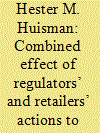

|
|
|
|
|
| Summary/Abstract |
Active consumer participation in retail markets is crucial for an affordable and sustainable energy transition. While energy regulators encourage active consumer participation through policies which decrease consumers’ switching costs, energy retailers seek to advance customer retention to boost profits. This study investigates how these seemingly opposing goals influence consumer participation in energy retail markets. Using data on the Dutch energy markets, we combine micro-economic and marketing insights through a retailer-aggregated panel vector auto-regression (VAR) model and a market-level VAR to analyse the dynamic interactions. The results indicate that the regulator affects consumer participation both directly and indirectly through energy retailers’ actions. We conclude that energy retailers’ acquisition and retention actions do not counteract the regulator’s efforts to increase active consumer participation. While retention actions lead to decreased switching behaviour, they concurrently decrease perceived switch costs while increasing search behaviour and the consideration to switch. Therefore, retention actions may still improve consumer welfare. Our research reveals mediating relations that require comprehensive examination of the overall impacts of regulatory policies and energy retailer’s actions.
|
|
|
|
|
|
|
|
|
|
|
|
|
|
|
|
| 18 |
ID:
110434


|
|
|
|
|
| Publication |
2011.
|
| Summary/Abstract |
Facing global climate change and scarce petroleum supplies, the world must switch to sustainable energy systems. While historical transitions between major energy sources have occurred, most of these shifts lasted over a century or longer and were stimulated by resource scarcity, high labor costs, and technological innovations. The energy transition of the 21st century will need to be more rapid. Unfortunately, little is known about how to accelerate energy transitions. This article reviews past transitions and factors behind them, along with their time frames. Three modern case studies are discussed: Brazil, which shifted from an oil-based transportation system to one based on sugarcane-ethanol (success); France, which shifted from oil-fired electric power to nuclear power (success); and the United States, which attempted to shift from foreign oil to a mix of domestic energy resources (failure). Lessons from these attempts to govern energy transitions are discussed. Several policy instruments to accelerate a transition are identified, though even under ideal circumstances a global energy supply transition will be very slow. Given the need to simultaneously implement programs in countries with different political economies, a greater focus on energy efficiency, promotion of Smart Grids, and possibly a new treaty should yield more timely results.
|
|
|
|
|
|
|
|
|
|
|
|
|
|
|
|
| 19 |
ID:
193262


|
|
|
|
|
| Summary/Abstract |
The central thesis of this commentary focuses on the paradox of two wars occurring in parallel with Russian aggression in Ukraine. It is not just that—in addition to military action—there is a geopolitical tsunami and its consequences in the form of a possible food crisis, mass migration, or an already open energy war. The paradox relates to the fact that a potential Ukrainian victory could have adverse effects on the welfare of European countries as a consequence of the embargo on Russian hydrocarbons and the need to replace them (assuming there is no return to the ancien régime before the Russian aggression of February 24, 2022). The defeat of the Ukrainians, on the other hand, could lead to a so-called “new opening” and a gradual return to the import of Russian energy resources (which, although they will not obtain the pre-war volume, will provide energy stability for Europe in a period of diversifying contracts and developing investments in renewable energy sources).
|
|
|
|
|
|
|
|
|
|
|
|
|
|
|
|
| 20 |
ID:
177124
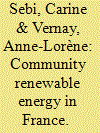

|
|
|
|
|
| Summary/Abstract |
Citizens can take an active part in the energy transition by participating in community renewable energy projects (CREPs). CREPs are emerging in France but their growth is simultaneously rapid and fragile. This paper describes the ongoing CRE movement in France based on an in-depth analysis at both the national and regional levels. To embrace the diversity of initiatives that exist, the paper proposes a typology of CREPs based on governance type and project size. We discuss the institutional, market, organisational and behavioural barriers that CREPs face. We also posit three enabling factors—financial, network and local capacity builders—and show that these factors contribute to explaining observed geographical disparities. We argue that policymakers should recognize the plural role that CREPs can play locally and develop support schemes that reflect this plurality instead of pushing for ever-bigger projects. Finally, because CREPs are not able to meet the growing demand for locally sourced renewable energy, we posit that regulations should evolve to offer CREP participants the opportunity to consume CRE-generated energy and to directly link that consumption to their own energy bills.
|
|
|
|
|
|
|
|
|
|
|
|
|
|
|
|
|
|
|
|
|